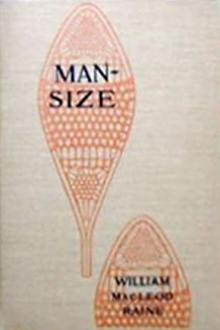Laughing Bill Hyde and Other Stories by Rex Beach (ebook smartphone .TXT) 📗

- Author: Rex Beach
Book online «Laughing Bill Hyde and Other Stories by Rex Beach (ebook smartphone .TXT) 📗». Author Rex Beach
For a time she regarded the monk silently.
"I am Zahra," she said at length, and Joseph thrilled at the tones of her voice. "To me, all things are music."
"Zahra! 'Flower of the World,'" he repeated, wonderingly. After an instant he continued, harshly, "Then you are the daughter of the Moor?"
"Yes. Abul Malek. You have heard of me?"
"Who has not? Aye, you were rightly called 'Flower of the World.' But—this music! It brought me here against my will; it pulls at me like straining horses. Why is that? What wizardry do you possess? What strange chemistry?"
She laughed lightly. "I possess no magic art. We are akin, you and I.
That is all. You, of all men, are attuned to me."
"No," he said, heavily. "You are an Infidel, I am a Christian. There is no bond between us."
"So?" she mocked. "And yet, when I sing, you can hear the nightingales of Aden; I can take you with me to the fields of battle, or to the innermost halls of the Alhambra. I have watched you many times, Brother Joseph, and I have never failed to play upon your soul as I play upon my own. Are we not, then, attuned?"
"Your veil!" he cried, accusingly. "I have never beheld a Moorish woman's face until now."
Her lids drooped, as if to hide the fire behind them, and she replied, without heeding his words: "Sit here, beside me. I will play for you."
"Yes, yes!" he cried, eagerly. "Play! Play on for me! But—I will stand."
Accordingly she resumed her instrument; and o'er its strings her rosy fingers twinkled, while with witchery of voice and beauty she enthralled him. Again she sang of love, reclinging there like an houri fit to grace the paradise of her Prophet; and the giant monk became a puppet in her hands. Now, although she sang of love, it was a different love from that which Joseph knew and worshiped; and as she toyed with him his hot blood warred with his priestly devotion until he was racked with the tortures of the pit. But she would not let him go. She lured him with her eyes, her lips, her luscious beauty, until he heard no song whatever, until he no longer saw visions of spiritual beatitude, but flesh, ripe flesh, aquiver and awake to him.
A cry burst from him. Turning, he tore himself away and went crashing blindly through the thicket like a bull pursued. On, on he fled, down to the monastery and into the coolness of his cell, where, upon the smooth, worn flags, he knelt and struggled with this evil thing which accursed his soul.
For many days Joseph avoided the spot which had witnessed his temptation; but of nights, when he lay spent and weary with his battle, through the grating of his window came the song of the Saracen maid and the whisper of her golden lute. He knew she was calling to him, therefore he beat his breast and scourged himself to cure his longing. But night after night she sang from the heights above, and the burden of her song was ever the same, of one who waited and of one who came.
Bit by bit she wore down the man's resistance, then drew him up through the groves of citron and pomegrante, into the grape fields; time and again he fled. Closer and closer she lured him, until one day he touched her flesh—woman's flesh—and forgot all else. But now it was her turn to flee.
She poised like a sunbeam just beyond his reach, her bosom heaving, her lips as ripe and full as the grapes above, her eyes afire with invitation. In answer to his cry she made a glowing promise, subtle, yet warm and soft, as of the flesh.
"To-night, when the moon hangs over yonder pass, I shall play on the balcony outside my window. Beneath is a door, unbarred. Come, for I shall be alone in all the castle, and there you will find music made flesh, and flesh made music." Then she was gone.
The soul of the priest had been in torment heretofore, but chaos engulfed it during the hours that followed. He was like a man bereft of reason; he burned with fever, yet his whole frame shook as from a wintry wind. He prayed, or tried to, but his eyes beheld no vision save a waiting Moorish maid with hair like night, his stammering tongue gave forth no Latin, but repeated o'er and o'er her parting promise:
"There you will find music made flesh and flesh made music."
He realized that the foul fiend had him by the throat, and undertook to cast him off; but all the time he knew that when the moon came, bringing with it the cadence of a song, he would go, even though his going led to perdition. And go he did, groveling in his misery. His sandals spurned the rocky path when he heard the voice of Zahra sighing through the branches; then, when he had reached the castle wall, he saw her bending toward him from the balcony above.
"I come to you," she whispered; and an instant later her form showed white against the blackness of the low stone door in front of him. There, in the gloom, for one brief instant, her yielding body met his, her hands reached upward and drew his face down to her own; then out from his hungry arms she glided, and with rippling laughter fled into the blackness.
"Zahra!" he cried.
"Come!" she whispered, and when he hesitated, "Do you fear to follow?"
"Zahra!" he repeated; but his voice was strange, and he tore at the cloth that bound his throat, stumbling after her, guided only by her voice.
Always she was just beyond his reach; always she eluded him; yet never did he lose the perfume of her presence nor the rustle of her silken garments. Over and over he cried her name, until at last he realized from the echo of his calling that he had come into a room of great dimensions and that the girl was gone.
For an instant he was in despair, until her voice reached him from above:
"I do but test you, Christian priest. I am waiting."
"'Flower of the World,'" he stammered, hoarsely. "Whence lead the stairs?"
"And do you love me, then?" she queried, in a tone that set him all ablaze.
"Zahra," he repeated, "I shall perish for want of you."
"How do you measure this devotion?" she insisted, softly. "Will it cool with the dawn, or are you mine in truth forever and all time?"
"I have no thought save that of you. Come, Light of my Soul, or I shall die."
"Do you then adore me above all things, earthly and heavenly, that you forsake your vows? Answer, that my arms may enfold you."
He groaned like a man upon a rack, and the agony of that cry was proof conclusive of his abject surrender.
Then, through the dead, black silence of the place there came a startling sound. It was a peal of laughter, loud, evil, triumphant; and, as if it had been a signal, other mocking voices took it up, until the great vault rang to a fiendish din.
"Ho! Hassam! Elzemah! Close the doors!" cried the voice of Abul Malek.
"Bring the lights."
There followed a ponderous clanging and the rattle of chains, the while Fray Joseph stood reeling in his tracks. Then suddenly from every side burst forth the radiance of many lamps. Torches sprang into flame, braziers of resin wood began to smoke, flambeaux were lit, and, half blinded by the glare, the Christian monk stood revealed in the hall of Abul Malek.
He cast his eyes about, but on every side he beheld grinning men of swarthy countenance, and at sight of his terror the hellish merriment broke forth anew, until the whole place thundered with it. Facing him, upon an ornamental balcony, stood the Moor, and beside him, with elbows on the balustrade and face alight with sinister enjoyment, stood his daughter.
Stunned by his betrayal, Joseph imploringly pronounced her name, at which a fresh guffaw resounded. Then above the clamor she inquired, with biting malice:
"Dost thou any longer doubt, oh, Christian, that I adore thee?" At this her father and her brothers rocked back and forth, as if suffocated by the humor of this jest.
The lone man turned, in mind to flee, but every entrance to the hall was closed, and at each portal stood a grinning Saracen. He bowed his shaven head, and his shame fell slowly upon him.
"You have me trapped," he said. "What shall my punishment be?"
"This," answered the Moorish lord; "to acknowledge once again, before us all, the falseness of your faith."
"That I have never done; that I can never do," said Joseph.
"Nay! But a moment ago you confessed that you adored my daughter above all things, earthly or heavenly. You forswore your vows for her. Repeat it, then."
"I have sinned before God; but I still acknowledge Him and crave His mercy," said the wretched priest.
"Hark you, Joseph. You are the best of monks. Have you ever done evil before this night?"
"My life has been clean, but the flesh is weak. It was the witchcraft of Satan in that woman's music. I prayed for strength, but I was powerless. My soul shall pay the penalty."
"What sort of God is this who snares His holiest disciple, with the lusts of the flesh?" mocked Abul Malek. "Did not your prayers mount up so high? Or is His power insufficient to forestall the devil? Bah! There is but one true God, and Mohammed is His Prophet. These many years have I labored to rend your veil of holiness asunder and to expose your faith to ridicule and laughter. This have I done to-night."
"Stop!" cried the tortured monk. "Bring forth a lance."
"Nay! Nay! You shall hear me through," gloated Abul Malek; and again
Joseph bowed his tonsured head, murmuring:
"It is my punishment."
Ringed about thus by his enemies, the priest stood meekly, while the sweat came out upon his face; as the Saracen mocked and jeered at him he made no answer, except to move his lips in whispered grayer. Had it not been for this sign they might have thought him changed to stone, so motionless and so patient did he stand. How long the baiting lasted no one knew; it may have been an hour, then Joseph's passive silence roused the anger of the overlord, who became demoniac in his rage. His followers joined in harrying the victim, until the place became a babel. Finally Elzemah stepped forward, torch in hand, and spat upon the giant black-robed figure.
The monk's face whitened, it grew ghastly; but he made no movement.
Then in a body the infidels rushed forth to follow the example of
Abul Malek's son. They swarmed about the Christian, jeering, cursing,
spitting, snatching at his garments, until their master cried:
"Enough! The knave has water in his veins. His blood has soured.
Deserted by his God, his frame has withered and his vigor fled."
"Yes," echoed his daughter. "He is great only in bulk. Had he been a Man I might have loved him; but the evil has fled out of him, leaving nothing but his cassock. Off with his robe, Elzemah. Let us see if aught remains."
With swift movement her brother tore at the monk's habit, baring his great bosom. At this insult to his cloth a frightful change swept over the victim. He upheaved his massive shoulders, his gleaming head rose high, and in the glaring light they saw that his face had lost all sweetness and humility; it was now the visage of a madman. All fleshly passion stored through thirty years of cloister life blazed forth, consuming reason and intelligence; with a sweep of his mighty arms he cleared a space about him, hurling his enemies aside as if they were made of straw. He raised his voice above the din, cursing God and men and Moors. As they closed in upon him he snatched from the hands of a lusty slave a massive wrought-iron brazier, and whirling it high above his head, he sent its glowing coals flying into the farthest corners of the room. Then with this weapon he laid about him right and left, while men fell like grain before the reaper.
"At him!" shouted Abul Malek, from his balcony. "Pull down the weapons from the walls! The fool is mad!"
Zahra clutched at her father's sleeve





Comments (0)